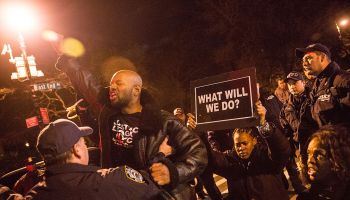United States Army soldier Henry L. Johnson (pictured), also known as “Black Death,” earned his fearsome nickname in France during World War I. After being ambushed by German forces and taken captive, Johnson freed himself and other soldiers using just a rifle and a knife. His heroic act was rewarded by France officials and has been awarded posthumously several times over. NewsOne takes a look back at the riveting tale of Johnson’s run-in with the Germans as he fought his way to freedom and future glory.
SEE ALSO: Robert Smalls, Family Escape To Freedom On This Day In 1862
Details of Johnson’s early life are scattered, with some historians saying he was born in Alexandria, Va., and others stating North Carolina was his place of birth. What is agreed upon, however, is that he moved to Albany, N.Y., as a teenager and took on a series of odd jobs, including working as a porter at Albany’s Union Station train stop.
While in Albany, Johnson married and had three children but still decided there were adventures to be had outside of upstate New York. Johnson joined the Army in June of 1917 in Brooklyn — just two months after the United States declared war on Germany. Johnson was initially part of a National Guard unit, which was later absorbed by the 369th Infantry – a mostly African-American group combined with the Ninety-third Division of the American Expeditionary Force (AEF).
Not surprisingly, the U.S. Army used the AEF as laborers and ship workers. Nearly three-thirds of the 200,000 troops worked in this capacity, and only saw the frontlines within the ranks of the French Army after their forces were heavily depleted. AEF forces also contended with fellow White soldiers, who went as far as slandering their names with a pamphlet warning French civilians about them and citing their “inferior nature.”
Johnson and 17-year-old Needham Roberts were on night watch duty while stationed in France. A German sniper fired off a round at Johnson’s post, and the soldier wisely prepared by grabbing a box of grenades. After the enemy cut wire surrounding his post, Johnson tossed grenades toward the Germans and surprised them. Numbering about 20 deep, the enemy troops returned fire and grenades. Roberts was injured by a German grenade, but he was able to toss Johnson weapons during his defense.
According to Johnson’s personal account, the Germans attempted to take Roberts prisoner, but he was able to fend them off. Surrounded and stuck with a jammed rifle, Johnson took a bolo knife and began slashing at the Germans. They stabbed and beat him, but he did enough damage to save him and his comrade’s life and was assisted by fellow soldiers who came to their aid an hour after the melee began.
Johnson and Roberts suffered several wounds; Johnson had 21 wounds and fainted from his injuries en route to a French hospital. Army officials inspected the site of the clash the next morning and found four German soldiers dead and a large cache of weapons. It was said that there may have been more dead soldiers there, and it appeared that many as 32 Germans stormed the post’s fences.
Johnson was a short, slight man of five feet, four inches, weighing 130 pounds. With a humility that matched his diminutive stature, Johnson did not chase accolades or approval. “There wasn’t anything so fine about it,” he said later. “Just fought for my life. A rabbit would have done that.”
Johnson’s fame and notoriety grew and his troop was dubbed “the Harlem Hell-Fighters” by the French press. France also awarded Johnson with its highest military honor, the Croix de Guerre for his efforts. Although the 369th was met with a parade February 1919 in celebration of their bravery, Johnson was largely unrecognized. Long after his passing in 1929, Johnson’s son, Herman, led an effort to see his father be awarded with the Medal Of Honor.
The Army used Johnson’s image and story to recruit young Black men to its ranks but never rewarded Johnson or his family in any other way.
Herman Johnson finally got part of his wish, though, in 1996, Johnson received the Purple Heart award, and in February 2003, after his father was posthumously awarded with the Distinguished Service Cross in a lavish ceremony in Albany.
An interesting bit of trivia is that Herman Johnson followed in his father’s footsteps and was a World War II pilot as part of the Tuskegee Airmen squad.
There are efforts still by members of Congress and the Johnson family to have the Medal of Honor, the United States military’s most-prestigious award, pinned to the late soldier’s lapel. It would be a shame if this were not to pass, considering Johnson exemplified the true spirit of wartime with his tremendous fighting spirit. Yet, what cannot be removed from the annals of history is the fact a young man made history simply trying to survive.
SEE ALSO: Williams Wells Brown Becomes 1st African-American Published Playwright On This Day In 1858
























